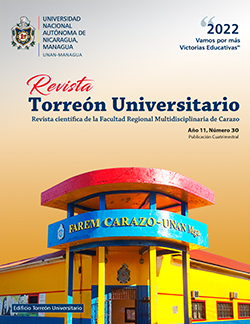Traces with a sense of humanity from re-inhabiting the school
DOI:
https://doi.org/10.5377/rtu.v11i30.13382Keywords:
school, paradigm, nature, humanism, education, human dignityAbstract
This article is configured from a reflective look at the reality assisted by a capitalist development system in which the meaning of life, happiness, and human fulfillment have been transposed towards having, dominion and power; an economic model framed in production and usufruct, in which the soft and delicate threads that weave the conditions of life on the planet have been broken and degraded and the humanist traces in the path of the human have been erased; which distorts its condition as a model of development and translates into social inequity, inequality, marginalization, and poverty. Thinking about how to mend the fabrics of life again and configure new humanist traces, requires defining an education whose inspiration is to make the condition of the human being worthy; to inhabit the school again as a scenario to conjugate with actions the verbs humanize and power and to rethink the meaning and essence of teaching and even the role of the teacher and the student from other perspectives, looks, and logics.
Downloads
References
Arroyave, D. (2021). Guía del Seminario de línea II: Estudios críticos sobre educación y currículo. Universidad de San Buenaventura.
Beorlegui, C. (2011). La singularidad del ser humano como animal bio-cultural. Realidad, 443-480.
Bermejo, J. C. (2018). Humanización y acción. Revista Iberoamaericana de Bioética, 1-16.
Boff, L. (28 de 11 de 2014). Koinonia. Obtenido de https://www.servicioskoinonia.org/boff/articulo.php?num=676
Boom, A. M. (2019). ¿Para qué nos educamos hoy? Escolarización y educapital. En C. E.
Careaga, M., & Avendaño, A. (2017). Currículum cibernético y gestión del conocimiento: fundamentos y modelos de referencia. Ril.
Carneiro, R., Toscano, J. C., & Díaz, T. (2021). Los desafíos de las TIC para el cambio educativo. Santillana.
Castillejo, J., Colom, A., Rodríguez, T., Sarramona, J., Touriñán, J., & Vásquez, A. P. (2011). Educación para el consumo. Educación XXI, 35-58.
Congregación para la educación católica. (2018). Educar para el humanismo solidario. Revista de la Universidad de la Salle, 12-28.
Escobar, R., & Escobar, M. (2016). La relación entre el pensamiento complejo, la educación y la pedagogía. Administración y desarrollo, 88-99.
Freire, P. (2000). Pedagogia da indignação: cartas pedagógicas e outros escritos. UNESP.
Freire, P. (2005). Pedagogía del oprimido. Siglo XXI.
Fundación Santillana. (2020). La escuela que se viene. Reflexión para la acción. Fundación Santillana
Guarín, E. A., & Rojas, A. (2018). La medida de la solidaridad en cuanto responsabilidad del Estado. En E. A. Guarín, & A. Rojas, La medida de la solidaridad en cuanto responsabilidad del Estado y derecho de los asociados (pág. 113). Universidad Católica de Colombia.
Hernández, M. H. (2017). Variedades de capitalismo, implicaciones para el desarrollo de América Latina. Economía: teoría y práctica, 195-226.
Hessel, S., & Morin, E. (2012). El camino de la esperanza. Una llamada a la movilización cívica. Epub.
Jaramillo, D. A., Cortés, E. J., & Jaramillo, G. (2020). Experiencia, memoria y responsabilidad: la escuela como lugar de encuentro y donación. Teri, 147-162.
Marco, M. E. (2020). El sentido de la educación desde lo humano: Apuntes a partir de Martha Nussbaum y Francisco Ruiz Sánchez. Revista Electrónica Educare, 1-18.
Mejía, M. R. (2019). Reinventar la transformación social y los nuevos desafíos de la educación popular y los movimientos sociales. En M. R. Mejia, Acción social colectiva y pedagogía (págs. 35-94). MAGISTERIO.
Morin, E. (2011). La vía para el futuro de la humanidad. Paidós.
Morín, E. (2020). Cambiemos de vía. Planeta.
Oficina Internacional para la Educación (OIE). (2017). 15 Claves de Análisis para Apuntalar la Agenda Educativa 2030. UNESCO.
Organización de las Naciones Unidas para la Educación, la Ciencia y la Cultura. UNESCO. (2015). Replantear la educación ¿hacia un bien común mundial? Ediciones UNESCO.
Osuna, S. (2018). La otra educación. Pedagogías críticas para el siglo XXI. En R. Aparici, C. Escaño, & D. G. Marín, LA OTRA EDUCACIÓN, pedagogías críticas para el siglo XXI (págs. 59-64). UDED.
Reyes, N. R. (2017). ¿Educación para el mercado. Diálogos , 3-6.
Riechmann, J. (2012). El socialismo puede llegar sólo en bicicleta. PAPELES de relaciones ecosociales y cambio global, 175-190.
Valdés, C. (2018). Habitar la educación. Vinculaciones y desvinculaciones entre los niveles escolares. Fondo Editorial Universidad Católica Luis Amigó.
Downloads
Published
Issue
Section
License
Copyright (c) 2022 National Autonomous University of Nicaragua, Managua (UNAN-Managua).

This work is licensed under a Creative Commons Attribution-NonCommercial-NoDerivatives 4.0 International License.
The authors who publish in this journal agree to the following terms.
- The author or authors of the articles, essays or research grant the National Autonomous University of Nicaragua, Managua (UNAN-Managua) the editing rights (copyright) of the submitted work, therefore the University has the exclusive right to publish the article for the entire copyright period.
- These copyrights/authors authorize Torreón Universitario Magazine and the University to edit and disseminate/publish the article in said Magazine, including printed and electronic reproduction, storage, retrieval and any other type of publication, and sources of secondary information as services. of summaries and databases, they also empower it to protect the article against unauthorized use for dissemination by printed or electronic media (PDF, HTML, EPUB, XML or others).
License for use of content
The magazine uses the Creative Commons Attribution-NonCommercial-NoDerivs 4.0 International License.
Under this statement:

This journal is licensed under a Creative Commons Attribution-NonCommercial-NoDerivatives 4.0 International License. It can be copied, distributed and transmitted publicly as long as the author and source are cited (Revista Torreón Universitario), it should not be modified or used for any commercial purpose. The full license can be found at http://creativecommons.org/licenses/by-nc-nd/4.0/.



